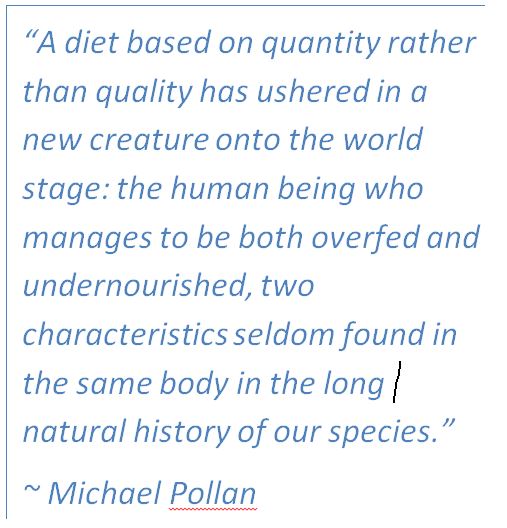Food is fuel. Excellent food, excellent fuel. Good food, good fuel. Poor food, poor fuel. What are you fueling your wonderful body with?
Michael Pollan is one of the leading thinkers and writers in the field of food and nutrition. Pollan has stated that his findings after extensive study can be summed up in these 7 words: “Eat food, not too much, mostly plants.”
Nutrition or Nutritionism?
One of the problems as Pollan sees it is in a practice he calls “nutritionism”. Not nutrition . . . nutritionism. “As the ‘ism’ suggests,” says Pollan, “it is not a scientific subject but an ideology.” The trouble with nutritionism is that scientists in the food industry begin to believe that they can improve on real, whole food by isolating the component nutrients and then processing ingredients to contain the “good” stuff and reduce or eliminate the “bad” stuff. There are a couple of things wrong with this.
Take broccoli for example. It has a whole host of good nutrients – Vitamin A, vitamin C, several B vitamins plus many other nutrients. Now, suppose our food scientist discovers that he can synthesize vitamin A and insert synthesized vitamin A into various factory processed foods. We, as consumers, are told that here is an important nutrient that we can get by consuming product Y. However, we don’t really know if our bodies will process the vitamin A in product Y the same way they process the nutrient in fresh broccoli. Plus there are all the other vitamins + a number of minerals + fiber available in fresh broccoli that have been processed out of the factory produced food.
What is “good” and what is “bad”?
Another problem is that our ideas about “good” and “bad” components change as new information is received. Once upon a time, fats were considered to be “evil”. People switched from butter to margarine. Now we know that margarine contains trans fats – much worse for you than the fat in butter. And then there are the “good” fats – monounsaturated fats, such as that found in olives and olive oil, avocados, and peanut butter.
To have a healthy diet, we need to look beyond nutritionism and get back to eating food — one of the premises of Pollan’s book, In Defense of Food.
Try these suggestions to eat a healthier diet.
- If it doesn’t need a label, eat as much as you want. If it requires a label, eat as little as possible.
- Start your day with the largest meal and progressively decrease your meal size as the day goes on.
- Stop eating before you are completely full. It takes your brain about 20 minutes to catch up to your stomach to know when you are full.
- Don’t eat anything with more than 5 ingredients or with ingredients you can’t pronounce.
- Do the majority of your grocery shopping around the perimeter of the store — this is where the fresh fruits and vegetables and fresh meats are found. Avoid the snack food and soda aisles — if you don’t bring it home, you won’t be tempted to have it.
- Give your body more of what it needs and less of what it doesn’t. Eat whole foods, stand more & sit less, reduce the junk, get enough sleep.
- Increase proteins and decrease carbs and sugars. You don’t have to go on a no-carb diet, but be sure that you have sufficient protein and complex carbs (fruits & vegetables) and fewer simple carbs (bread, chips, pasta) which quickly turn to sugar in the body.
- Add raw foods (vegetables, fruits, nuts) to your diet. Put simply, foods that are cooked are dead and foods that are raw are alive. The more live food we eat the more alive we feel.
- Give you body healthy fats and oils. These include extra virgin olive oil, sunflower oil, safflower oil, grapeseed and almond oil.
- Fiber not only fills you up but it has naturally occurring phytonutrients that help fight inflammation. Fiber helps to clean out the intestines for a healthier digestive system. To avoid bloating and discomfort, increase fiber intake slowly, aiming for 30 to 38 grams a day for men and 21 to 25 grams a day for women (21 grams a day if you are over 51).
Small steps = major diet improvements.
The 3 fundamentals of the good health which is absolutely essential to flourish and to live a life of well-being, meaning and purpose are getting adequate and ample rest, moving your body to keep it active, and eating the right amount and right kinds of fuel for your body. You can start today, right now, to begin making small changes in the way you eat, as you move to a healthier diet. Start with one of the changes listed here and take a small step to improve and begin making the change. Then take the next step, then the next. Soon, you will be eating healthier and feeling it in the amount of energy you have and well-being you feel. Small, incremental improvements, step by step, lead to massive improvements over time. That is embracing the Excelerated Life!
Excelerated Fundamentals™ — perfecting basic self-care practices — is one step in creating your Excelerated Life™, a life of flourishing and well-being and a life of meaning, purpose and service.
Pollan, Michael. In Defense Of Food: An Eater’s Manifesto. New York: Penguin Books, 2009



3 Replies to “Eat Food”